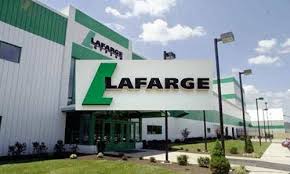Lafarge Africa Plc has expanded its range of sustainable construction materials with the introduction of ECOPlanet Elephant cement, a low-carbon product designed to reduce environmental impact in Nigeria’s building industry.
The company unveiled the new product at an event held in Lagos, positioning it as a vital solution for eco-conscious developers, builders, and infrastructure stakeholders aiming to reduce carbon emissions without compromising on quality.
In a statement released during the launch, Group Managing Director/Chief Executive Officer of Lafarge Africa, Lolu Alade-Akinyemi, described the new cement as a “game changer” for Africa’s construction sector. He noted that ECOPlanet Elephant follows the success of ECOPlanet Unicem, which was introduced in 2024 and received strong market reception.
“The industry’s positive reception to ECOPlanet Unicem last year demonstrated a clear demand for sustainable building materials. We are proud to now offer our low-carbon ECOPlanet Elephant cement, further empowering our customers to make environmentally conscious choices without compromising on the renowned quality and performance our products are known for,” Alade-Akinyemi said.
He revealed that the new cement achieves a 30 per cent reduction in carbon emissions compared to traditional cement alternatives, without any performance trade-offs.
“This launch marks another opportunity to build sustainably across Africa,” he said, adding that Lafarge remains committed to partnering with the construction ecosystem to deliver innovative, circular, and eco-efficient solutions that contribute to healthier communities and a greener environment.
Commercial Director of Lafarge Africa Plc, Gbenga Onimowo, also addressed stakeholders at the launch, stating that the ECOPlanet Elephant retains the signature strength, durability, and workability of the Elephant cement brand, while significantly lowering its carbon footprint.
“For us, building a sustainable future means that we carry our customers and partners on the journey with us. This is why I am very thrilled to see how much positive impact this will have on the industry,” Onimowo said.
He explained that the cement is already attracting interest from builders, architects, and policymakers due to its environmental benefits and versatile use across construction needs such as plastering, concreting, and on-site block making.
Onimowo also noted that ECOPlanet Elephant is aligned with advanced global green building standards, including BREEAM (Building Research Establishment Environmental Assessment Method), LEED (Leadership in Energy and Environmental Design), and EDGE (Excellence in Design for Greater Efficiencies). These certifications underscore the product’s relevance in modern sustainable architecture and infrastructure development.
The launch of ECOPlanet Elephant comes amid growing awareness of climate change and the need to decarbonise Nigeria’s economy, especially in high-emission sectors like construction. With the global cement industry accounting for about 7–8% of global CO₂ emissions, Lafarge Africa’s shift toward low-carbon solutions represents a strategic response to international and national climate goals.
Lafarge Africa’s move is part of the broader Holcim Group’s net-zero agenda, which includes investment in green technologies, alternative fuels, and circular construction materials across its global operations.
The Nigerian cement and construction industries have been under pressure to adopt greener alternatives amid the government’s commitments to the Paris Agreement and its net-zero emissions ambition by 2060. Products like ECOPlanet Elephant could play a critical role in helping developers meet sustainability targets while addressing Nigeria’s housing and infrastructure deficits.
As Nigeria continues to urbanise rapidly, low-carbon building materials are expected to become more central to construction planning and policy decisions.
